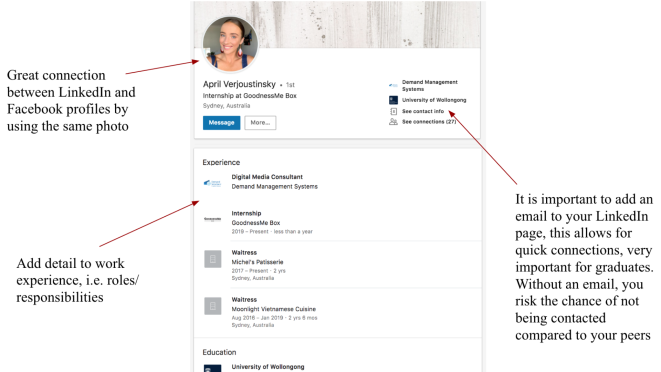Participant Two – Austin Smith
Austin is the Talent Engagement and Acquisition Manager for the Asia-Pacific region at Unispace, a multi-national design and construction firm based in Sydney. With close to 19 years experience across management consultancy and recruitment, Austin has experienced first hand the overhaul from traditional recruitment to the phenomena referred to as ‘ e-recruitment’.
Interview Questions and Answers
1) After an applicant has applied for a job position online, do you review their LinkedIn and Facebook profiles? Why these platforms?
After an applicant has applied for a posted job ad online, or if I have been “actively-recruiting” (seeking out candidates), I follow a step-by-step process.
- If the candidate is not suitable from their CV/resume, I automatically do not check their LinkedIn/ Facebook profiles.
- If there are ‘question marks’ over their CV, I first check LinkedIn, if I believe there may still be doubts across their profile, I proceed to check their Facebook. On a base level, I usually always check both LinkedIn and Facebook profiles, regardless of any ‘red flags’.
LinkedIn is an excellent cross-referencing platform, enabling recruiters to check for experience, accountability and credibility. I also believe Facebook is a tool that can be used to source additional information or as a general character check.
2) Do you believe it is important to be able to review university graduates LinkedIn and Facebook profiles? Is there a specific criterion to which recruiters follow or is it individualised for each recruiter?
For university graduates, it is critical their resume and Facebook are readily available for review. From my experience and research, fewer graduates are on LinkedIn, therefore I do not think it is as important to be able to review their profiles. That being said, graduates who are active on LinkedIn provide recruiters or employers with a substantial portfolio, which is valued.
It is important to be able to review a candidate’s Facebook, whether it be to cross-check geographical locations or to ensure the content they post (i.e. interests/ activities) aligns with the targeted company’s values and culture. However, even with Facebook, graduates are smart when in comes to setting their profiles on private, making it very difficult for recruiters to use as a recruitment tool, thus posing limitations in its effectiveness. Recruitment approaches are definitely individualised, which in itself can pose moral and ethical concerns.
3) What do you think are the pros and cons of using LinkedIn and Facebook when evaluating a prospective employee?
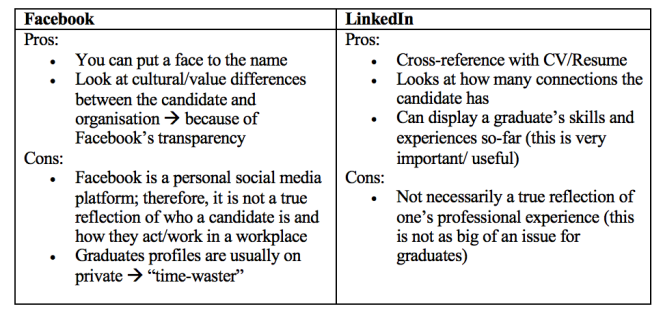
4) Do you think the moral, ethical and social risks that may arise from reviewing an individual’s online profiles, are enough to deter recruiters from using these platforms entirely?
No, I believe the overall perception is that the risks are very minor. I do believe the risks may differ across platforms, for example as LinkedIn is strictly a professional platform, the risks would not deter recruiters from using it. However, with Facebook, the issue of whether or not reviewing one’s profile breaches concerns regarding privacy, may impact a limited number of cases, however still would not deter entirely.
5) Do you think LinkedIn and Facebook are an effective and fair means to evaluate a future university graduate on? If yes, why. If no, please explain.
Yes, I do believe LinkedIn and Facebook are an effective and fair means for evaluation. If a graduate is wanting to stand amongst hundreds or other applicants, displaying ambition through completing work experience and detailing this on their LinkedIn profile, along with a monitored Facebook profile, is essential. In most cases, graduates will have access to these platforms, therefore they are a fair playing field. Personally, I do not believe you can make an insightful opinion through solely using these platforms as an assessment tool, however, the information they provide is still very useful and should not be dismissed.
6) Do you believe the recruitment process has experienced added-value as a result of being able to assess individuals based on their LinkedIn and Facebook profiles?
Absolutely! In terms of my personal experience and having worked in recruitment before LinkedIn and Facebook were introduced as tools of ‘e-recruitment’, traditional recruitment was very difficult. The process was extremely time-consuming, where to find potential job applicants you would have to gain referrals, advertise or look in the Yellow Pages. Specifically, the tools available within LinkedIn as a platform are incredible, allowing you to gain access to a wider audience. Take graduates as an example, you are able to refine your search based on where they went to university, whether or not they are passive/active online and if they have had internship or work experience – this is key!
Review of Future Marketing Graduates LinkedIn and Facebook Profiles
Participant two has reviewed each student’s LinkedIn and Facebook, providing recommendations on certain elements within their profiles.
Brittany Ritchie
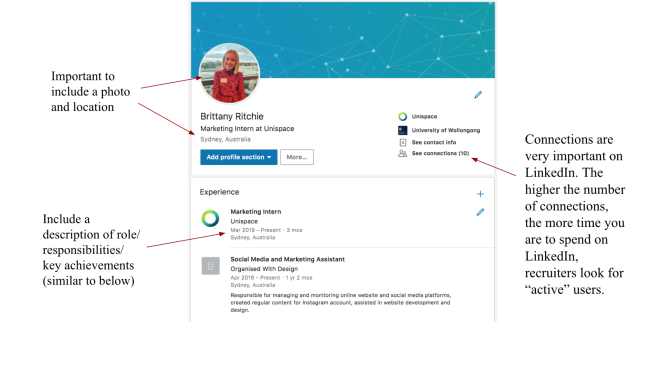 Facebook
Facebook
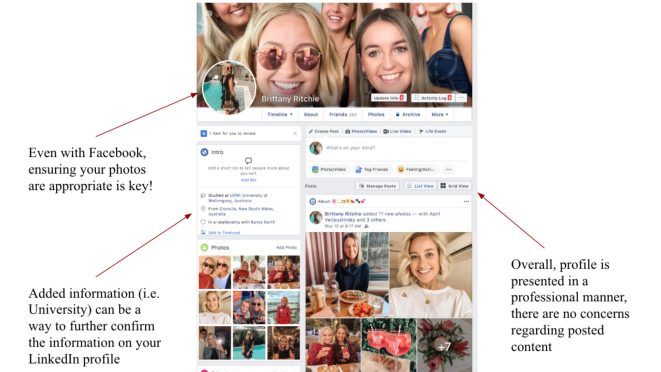
Conor Robinson
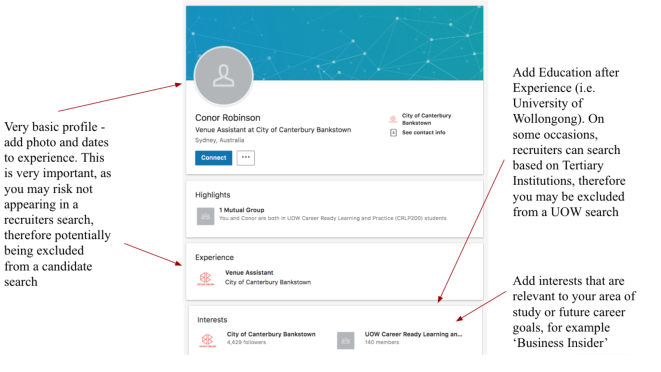 Facebook
Facebook
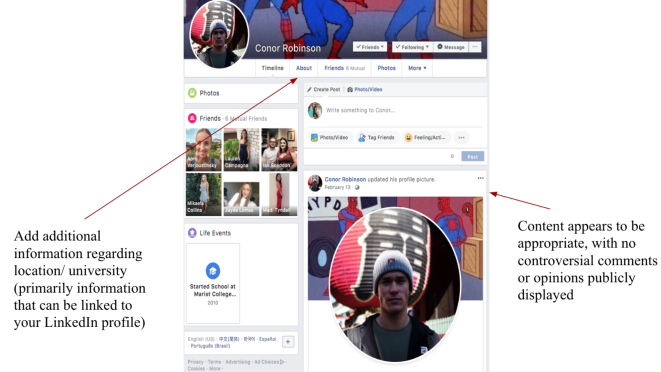
April Verjoustinksy
